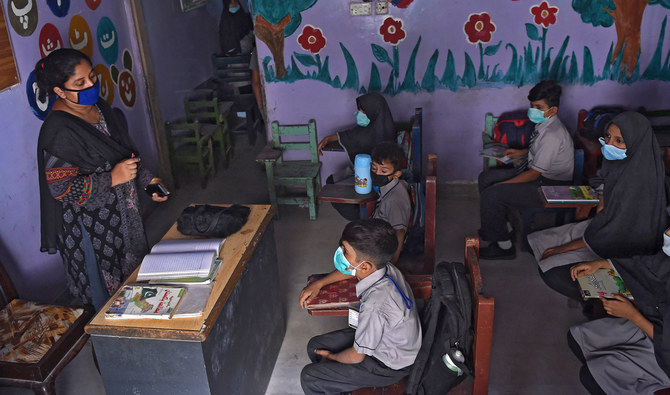ISLAMABAD: A nationwide study conducted by the faculty at Aga Khan University’s Institute for Educational Development revealed on Thursday that more than 90 percent of primary and pre-secondary students in Pakistan have a weak or basic understanding of mathematics and science subjects which they are required to learn.
The research involved over 15,000 students from grades 5, 6 and 8 who were taken from 153 different public and private schools.
The students took standardized tests in math and science as part of the study that was funded by the Higher Education Commission of Pakistan, the country’s top education authority.
The findings of the research painted a dismal picture, showing an average test score of 27 out of 100 in mathematics and 34 out of 100 in science.
Only one percent of children were able to score more than 80 percent in both subjects, demonstrating “excellent understanding” of the subjects as per researchers. In science, girls slightly outperformed boys while both fared the same in mathematics.
“The average score in private schools was higher than in public schools, but did not exceed 40 in either subject,” says the report, adding: “The average score in Punjab was the highest among the country’s regions but did not exceed 40 in either subject.”
“Science and mathematics education is in dire need of attention from practitioners and policymakers,” said Assistant Professor Nusrat Fatima Rizvi, a study co-principal investigator.
Researchers found that multiple factors significantly correlated with students’ learning outcomes.
“In increasing order of importance, those factors were high-quality teaching practices, a student’s mother having a bachelor’s or master’s degree (a father’s educational attainment was relatively less important), only one language being used in the classroom, attending private school and going to school in Punjab,” the report continued.
“Surprisingly, students tended to learn less from experienced teachers than from those new to the profession. They also tended to learn less from teachers with a degree in education, compared to teachers having no degree in education,” it added.
As part of the study, researchers visited the classrooms of 589 teachers to assess the quality of the education being imparted to students.
“The teaching practices of nearly 9 in 10 were graded weak, and roughly 1 in 10 were graded mediocre,” the study said.
“In most classrooms, teachers spend their time reading and explaining words from the textbook instead of encouraging students to ask questions or participate in activities that bring concepts to life,” said Associate Professor Sadia Bhutta, the study’s principal investigator. “This results in poor understanding of concepts and poor performance on tests.”
Another important finding of the study was that students in monolingual classrooms – where the textbook, teaching and examinations were all in one language – outperformed those in multilingual classrooms.
Teachers also pointed out the need for professional development opportunities to improve both their subject matter knowledge and their ability to reflect on their own teaching.
















